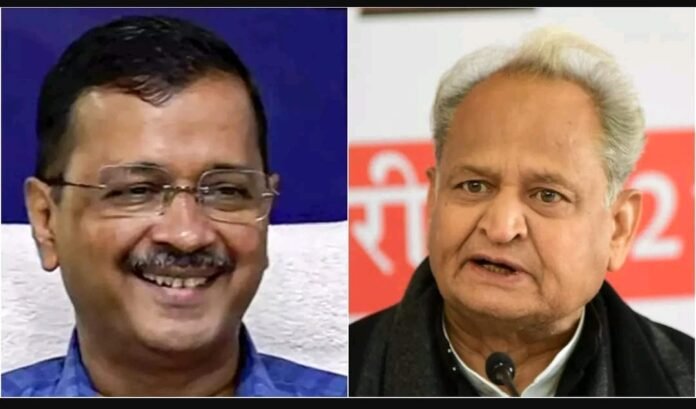In a surprising turn of events, Arvind Kejriwal, the Chief Minister of Delhi and national convenor of the Aam Aadmi Party (AAP), intensified his criticism of the Congress party and targeted Rajasthan Chief Minister Ashok Gehlot. Kejriwal’s bold move has left many observers questioning the prospects of opposition unity in the face of upcoming elections.
Kejriwal’s scathing remarks, made on Sunday, come at a crucial time when efforts are being made to forge a united front among opposition parties to challenge the ruling Bharatiya Janata Party (BJP) in national and state elections. While some opposition leaders have been advocating for a coalition to consolidate anti-BJP votes, Kejriwal’s attack on Congress and Gehlot has raised eyebrows and exposed deep-seated fissures within the opposition ranks.
The Delhi Chief Minister did not mince his words as he took aim at the Congress party, a traditional rival of his AAP, accusing it of being “anti-people” and engaging in corrupt practices. Kejriwal’s sharp critique questioned the Congress’ commitment to fighting against the BJP, implying that the party was failing to provide a viable alternative to the ruling government.
Adding fuel to the fire, Kejriwal also directed his ire towards Ashok Gehlot, the Chief Minister of Rajasthan and a senior Congress leader. Gehlot, known for his astute political maneuvering, was on the receiving end of Kejriwal’s verbal onslaught, with the Delhi Chief Minister suggesting that Gehlot’s leadership lacked vision and was unable to effectively counter the BJP in Rajasthan.
The timing of Kejriwal’s attack has sparked speculation about the potential impact on the broader opposition unity efforts. With several state elections on the horizon and the looming national elections, the opposition parties have been trying to bridge their ideological and regional differences to present a united front. However, Kejriwal’s direct confrontation with the Congress and Gehlot has unveiled the underlying tensions and power struggles within the opposition coalition.
Political analysts suggest that Kejriwal’s aggressive stance might be driven by his desire to assert his party’s independent identity and consolidate his support base in Delhi. The AAP has been successful in local elections in the capital city and is seeking to expand its presence in other states as well. By openly challenging the Congress and Gehlot, Kejriwal aims to position his party as a distinct alternative to both the BJP and the Congress.
While the ramifications of Kejriwal’s attack on the opposition coalition remain uncertain, it undoubtedly adds another layer of complexity to an already intricate political landscape. As the countdown to the upcoming elections begins, the focus will now be on how the opposition leaders navigate these challenges and whether they can overcome their differences to present a united front against the BJP’s formidable electoral machinery.

